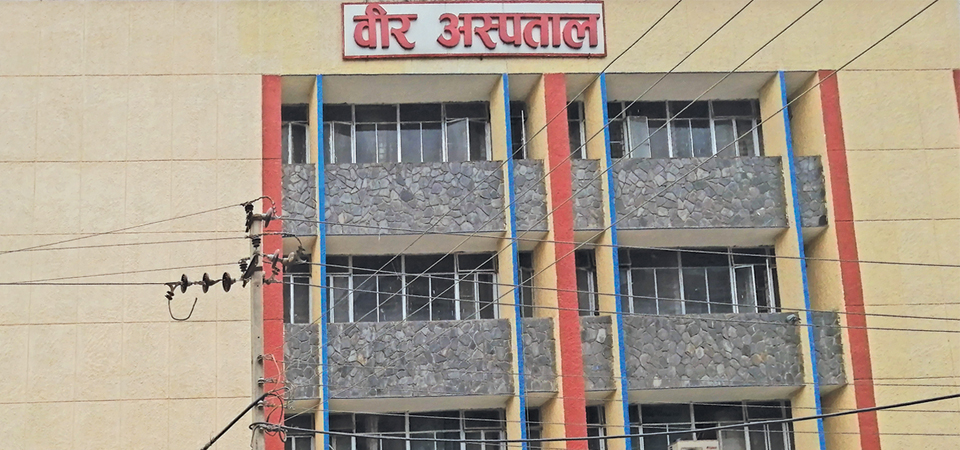Valley hospitals prepare to fight probable Omicron cases

By A Staff Reporter
Kathmandu, Dec. 8 The new variant of COVID-19, known as Omicron, has already spread in scores of countries across the world. So far, Nepal has recorded two cases of Omicron variant some 12 days after it was reported for the first time by South Africa and four days after it was detected in India.
The Ministry of Health and Population (MoHP) had confirmed two cases of Omicron variant on Monday, December 6. The World Health Organisation (WHO) has already classified Omicron as the 'Variant of Concern'.
The MoHP has requested the public to continue following all the health and safety standards and participating in the government's vaccination drive to stay safe from the variant. Dr. Santosh Dulal, research scientist and COVID-19 lab chief at Aanandaban Hospital, said that abiding by the public health standards was vital as the Omicron variant could possibly spread faster than other variants.
Similarly, Dr. Sher Bahadur Pun, chief of clinical research unit at Teku Hospital, said that rather than being terrified of the new variant, we should focus on alertness. "As researches are underway to determine the severity and transmissibility of Omicron, we are currently at 'wait and see ' situation," he said.
Dr. Manisha Rawal, director of Teku Hospital, also said that following public health standards could prevent the rapid spread of the new variant.
While the cases of new variant are being seen in the USA, India, UK and other European countries, the government is mulling over the measures to prevent the spread. The COVID-19 hospitals within the Kathmandu Valley have already adopted high alertness.
Armed Police Force Hospital
Dr. Prabin Nepal, focal person of the hospital, informed that the hospital was ready to battle the new variant in case it spread rapidly. "We have readied isolation ward with 200 beds. Also, if the cases of new variant start increasing, then we will separate 30 beds for Intensive Care Unit (ICU)," he added.
Dr. Nepal said that an oxygen plant of 100 litres had been installed in the hospital and the hospital was planning to set up another oxygen plant with a capacity of 200 litres.
Civil Service Hospital
Civil Service Hospital is also prepared to fight the new variant, informed Dr. Bidesh Bista, focal person of the hospital. He said, "Our hospital had started preparations for the possible third wave. Thus, we are already prepared to tackle Omicron variant."
Dr. Bista informed that 50 High Dependency Units and 15 ICU beds were separated for COVID-19 patients. We are preparing to begin the operation of COVID-19 ward within a week, he said, adding that an oxygen plant with 200 litres capacity had been installed in the hospital.
TU Teaching Hospital
Dr. Ram Bikram Adhikari, information officer at the hospital, said that the hospital was well-equipped to treat 500 to 600 COVID-19 patients at once.
"We have learnt a lot from the second wave. Thus, we are already in a position to deal with the new variant or the possible third wave," said Dr. Adhikari, adding that a total of 50 HDU beds were available in the hospital.
He further said that the hospital had installed oxygen plant which can produce 2,000 litres of oxygen in a minute.
Bir Hospital
Dr. Bhupendra Basnet, chief of Bir Hospital, said that the hospital had introduced telemedicine service for the treatment of COVID-19 patients. "We have set aside 209 beds for COVID-19 patients in case the virus spreads rapidly," he said. The hospital is equipped with 100 ICUs and HDU beds, said Dr. Basnet, adding that the hospital would not face shortage of oxygen again. Currently, the hospital has an oxygen plant with 250 litres capacity.
Sukraraj Tropical and Infectious Disease Hospital
The COVID-19-dedicated hospital has already issued an alert and provided training to the health workers and staffers regarding the new variant, said director Dr. Rawal.
She added that the hospital resumed the operation of vaccine clinic from Sunday. There are 24 ICUs, a COVID-19 isolation ward and an oxygen plant with over 20,000 litres capacity at Teku Hospital.
Meanwhile, the MoHP has informed that it has been making efforts to minimise the risk of Omicron in Nepal.
Dr. Samir Kumar Adhikari, assistant spokesperson at the ministry, said, "Following the detection of Omicron in Nepal, we have been conducting the monitoring, surveillance and contact tracing more effectively."
"Managing the flow of people into and out of the nation via international flights and borders, we have made negative RT-PCR test report compulsory," he said.
"Antigen tests are being performed on entrants who have not received the full dose of COVID-19 vaccines and those having the symptoms of the virus infection," said Dr. Adhikari, adding, "Furthermore, RT-PCR tests and gene sequencing of antigen positive samples are also being done."
Recent News

Do not make expressions casting dout on election: EC
14 Apr, 2022
CM Bhatta says may New Year 2079 BS inspire positive thinking
14 Apr, 2022
Three new cases, 44 recoveries in 24 hours
14 Apr, 2022
689 climbers of 84 teams so far acquire permits for climbing various peaks this spring season
14 Apr, 2022
How the rising cost of living crisis is impacting Nepal
14 Apr, 2022
US military confirms an interstellar meteor collided with Earth
14 Apr, 2022
Valneva Covid vaccine approved for use in UK
14 Apr, 2022
Chair Prachanda highlights need of unity among Maoist, Communist forces
14 Apr, 2022
Ranbir Kapoor and Alia Bhatt: Bollywood toasts star couple on wedding
14 Apr, 2022
President Bhandari confers decorations (Photo Feature)
14 Apr, 2022











